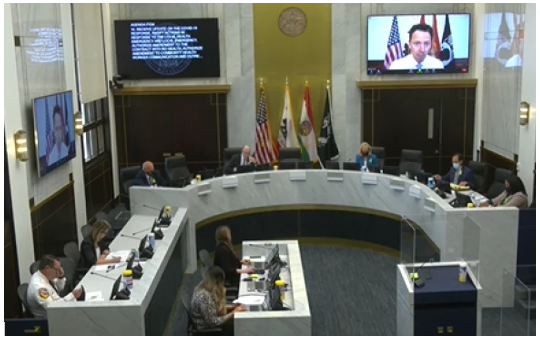CommentsCOMMENTARY-Much as many of us have come to dislike Zoom meetings and long for in-person interactions when great ideas are discussed in Neighborhood Council meetings, there are many powerful arguments to maintain virtual attendance as a robust option.
There is the time issue, not so much the length of the meeting but the time necessary to get to the location and then go home. People often come directly from work which can be well outside their neighborhood and the commute is also exacerbated by traffic congestion.
And that leads into the need to balance in-person meetings with the need to reduce our carbon footprint. Public transit still pollutes and can considerably extend the length of the commute and, all too often, there are no or very limited options after the meeting.
Which brings up the question of personal safety, especially at night and in this time of defunded police, but also in the meetings themselves.
With the escalation of threats online, who’s to say that the very occasional Neighborhood Council pushy-shovey match wouldn’t expand into full scale brawls in these intemperate times?
And then there are equity issues ranging from childcare to parking costs.
The Brown Act
Under the Brown Act, officials and members of the public must be physically present at a meeting in order to participate. But Gov. Gavin Newsom waived this requirement via a March 2020 executive order at the start of the coronavirus pandemic. Newsom's order also authorized local government bodies to hold their public meetings virtually.
On March 12, 2020, Governor Newsom issued an Executive Order to temporarily amend the allowable procedures for public meetings of local agencies subject to the Ralph M. Brown Act to allow for full online participation of both elected officials and the public.
The City’s IT department worked out the logistics for the City’s government in a few short weeks at the beginning of the pandemic, and Raquel Beltrán and her staff devised a virtual governance plan for Neighborhood Council meetings.
State Assembly Bill 339, introduced in January, is an effort to amend the Ralph M. Brown Act to “allow meetings to require all open and public meetings of a city council or a county board of supervisors that governs a jurisdiction containing least 250,000 people to include an opportunity for members of the public to attend via a two-way telephonic option or a two-way internet-based service option until December 31, 2023.”
However, as of the summer recess which started on July 16, it still appears to deny public comment unless such is in-person. And it excludes a number of agencies which is, in itself, undemocratic.
ACLU California Action has advocated on behalf of rural areas where people must drive 45 minutes to over an hour to make public comments at meetings. This is equally true for members of the public facing rush-hour commutes in Los Angeles.
Olivia Seideman, civic engagement coordinator for the Leadership Counsel for Justice and Accountability takes it further:
"We believe in transparency and accountability and open government and making sure that all people can access public meetings, not just those who live in urban centers and are easily able to access public meetings, and those who can take the time off to go and sit in-person and comment in the middle of the workday. We really see AB 339 as a chance to improve our democracy and make it more equitable. . .Without these remote options not everyone is able to have a seat at the decision-making table."
The State waiver has been extended several times, most recently to the end of September and, with the Delta variant running rampant, will likely be pushed through to December 31, 2021. After that – who knows?
The Future
Like a number of others, I feel strongly that Zoom meetings should continue, at least as an option, in perpetuity. They save on travel time, traffic, and pollution, allow participation of those who might otherwise not be able to go to a meeting including those who can’t afford childcare costs, those who cannot get the vaccine due to immunosuppression issues, those who out of the lack of respect that has evolved in meetings over the past year feel threatened to attend, those who are nervous in large groups for whatever reasons, and many other reasons.
Also, this doesn’t address Alliances and other pan-City groups, and people whose status as qualified stakeholders means they may not live near where their Neighborhood Councils meet.
At a recent Neighborhood Council Sustainability Alliance meeting, Raquel Beltrán announced she was chairing a working group to design a hybrid system for the Neighborhood Councils that would ensure access, uniformity, and equity.
We need to start advocating now to ensure our rights, all our rights, can be confirmed moving forward in this digital age.
Yes, there are costs and, yes, there are logistics to be devised. But look at the shift to Zoom meetings at the beginning of the pandemic. It can be done and done well. And save money in the long run. And what is most important – time.
And the time to start making all this possible is now.
(Liz Amsden is an activist from Northeast Los Angeles with opinions on much of what goes on in our lives. She has written extensively on the City’s budget and services as well as her many other interests and passions. In her real life she works on budgets for film and television where fiction can rarely be as strange as the truth of living in today’s world.) Prepped for CityWatch by Linda Abrams.
















